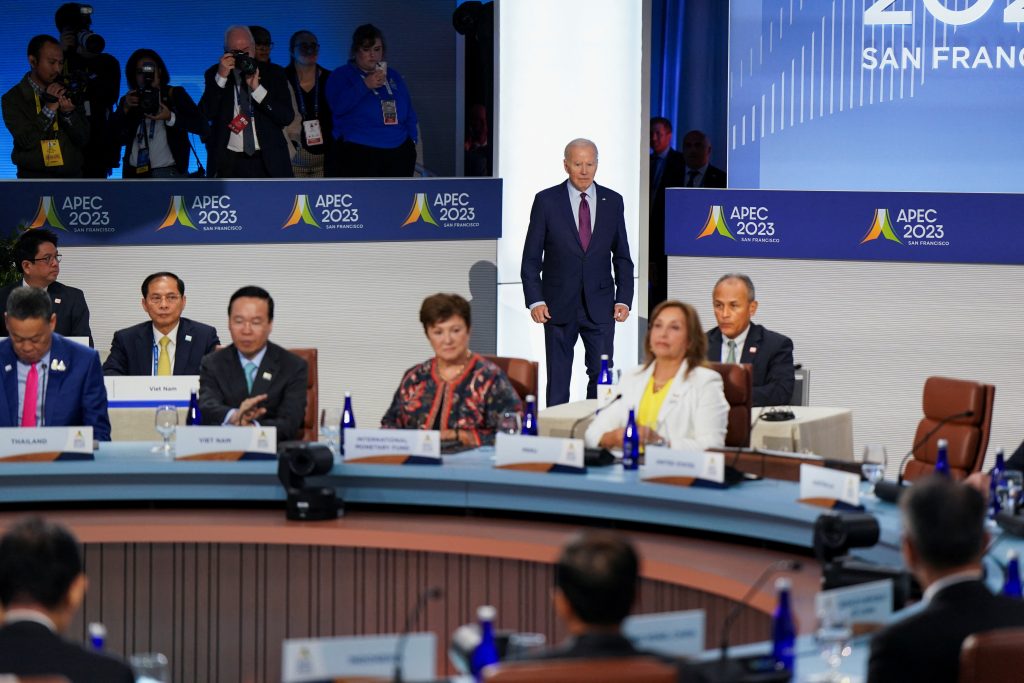Last year was a strong year for US foreign policy in Asia. Washington strengthened key alliances, upgraded relations with important partners, advanced institutional innovations in forums such as the Quadrilateral Security Dialogue and took advantage of a favourable diplomatic calendar to improve its standing in the region — all while re-normalising relations with Beijing.
These advances are dividends of the Biden administration’s Asia strategy. Biden’s cabinet focused on domestic issues in 2021 and used 2022 to align more closely with key allies and partners. These efforts built a foundation from which the United States could step up its presence in Asia in 2023.
The United States upgraded its relations with Indonesia and Vietnam, two strong and rising players in Southeast Asia. It also deepened its relationship with India, particularly in the technology and defence sectors. Working in tandem with key partners such as Australia, the United States bolstered its presence in the Pacific Islands as well.
Washington ably managed potential regional flashpoints in the Taiwan Strait, the South China Sea and the Korean peninsula. Perhaps most notably, it made strides in advancing relations with and among allies. Biden and his team engaged intensively with counterparts in Australia, the Philippines, South Korea and Japan. Japanese Prime Minister Kishida, South Korean President Yoon and President Biden’s decision to deepen trilateral cooperation at the Camp David Summit was a crowning achievement of a banner year.
Alongside these gains, the United States found firmer footing in its relations with China. After a tumultuous first half of 2023, Washington and Beijing reopened diplomatic channels and coordinated productive leader-level engagement between Biden and Chinese President Xi Jinping on the margins of the Asia-Pacific Economic Cooperation (APEC) leaders’ meeting in San Francisco.
Biden and Xi reaffirmed their mutual interest in managing tensions and limiting the risk of escalating tensions. Both militaries recommenced high-level communication after US Chairman of the Joint Chiefs of Staff Charles Brown held a video conference with People’s Liberation Army Chief of the Joint Staff Department General Liu Zhenli on 21 December 2023.
A key question going into 2024 is whether the Biden administration will be able to sustain US momentum in Asia. It will face formidable challenges in doing so. The first challenge is the diplomatic calendar. None of the major annual summits that US leaders regularly attend will generate tail wind for the United States’ regional strategy. Italy will host the G7, Brazil the G20, Laos will convene the East Asia Summit and Peru will organise APEC. With President Biden running for re-election in 2024, there is a low likelihood that he will spend meaningful time Asia, at least before the US presidential election in November 2024.
Washington will also have to deal with the effects of events occurring outside Asia. If the Biden administration is unable to continue supporting Ukraine’s defence against Russian aggression, it will create opportunities for Beijing to sell a narrative in Asia that the United States is absent and unreliable. If conflict between Israel and Hamas expands or escalates, US leadership will come under further stress. There is a risk that events outside Asia will put downward pressure on US leadership in Asia.
The unresolved debate inside the United States about its role in the world is another challenge. The US public is flirting with another periodic bout of isolationism. Whereas 65 per cent of liberals say that it is best for the United States to be active in the world, only 30 per cent of conservatives and 43 per cent of moderates agree. The difference between conservative and liberal views on the United States’ role in the world has expanded from 17 per cent in 2020 to 35 per cent in 2023. This growing ideological polarisation could constrain the Biden administration’s political room to manoeuvre during an election year.
These constraints will be most visible on trade. The absence of a credible trade and economic agenda for Asia has been the Biden administration’s greatest weakness. Political and national security imperatives will continue to drive the United States’ approach to trade. Do not expect any outbreak of creativity or boldness on trade by the Biden administration in 2024.
There will also be flashpoints and risks that will require steady management. These include North Korea’s anticipated sabre-rattling, China’s response to Taiwan’s January 2024 election and disputes in the South China Sea.
In their relations, both the United States and China will seek to reduce vulnerabilities brought on by interdependence with each other. They will focus on addressing their own internal challenges and weaknesses, even as they look for partners to provide a bulwark against competition with each other. US partners will likely hedge their support for further competitive actions against China until they are confident in the direction of US strategy beyond 2024.
The outcome of the 2024 US election will colour perceptions of US standing in Asia in coming years. Given the divided nature of the electorate, the outcome will be close. This certainly guarantees that 2024 is going to be nail-bitingly interesting.
Ryan Hass is Senior Fellow, the Koo Chair in Taiwan Studies and the Director of the China Center in the Foreign Policy program at the Brookings Institution.


In 2023, the United States made significant progress in Asia by bolstering its Asian alliances and fostering stronger connections with pivotal partners like India, Indonesia and Vietnam. The Biden administration also found firmer footing in its diplomatic ties with China. Still, internal political polarisation within the United States itself, coupled with conflicts around the world as well as the approaching US elections, pose challenges to sustaining American momentum in Asia in 2024.